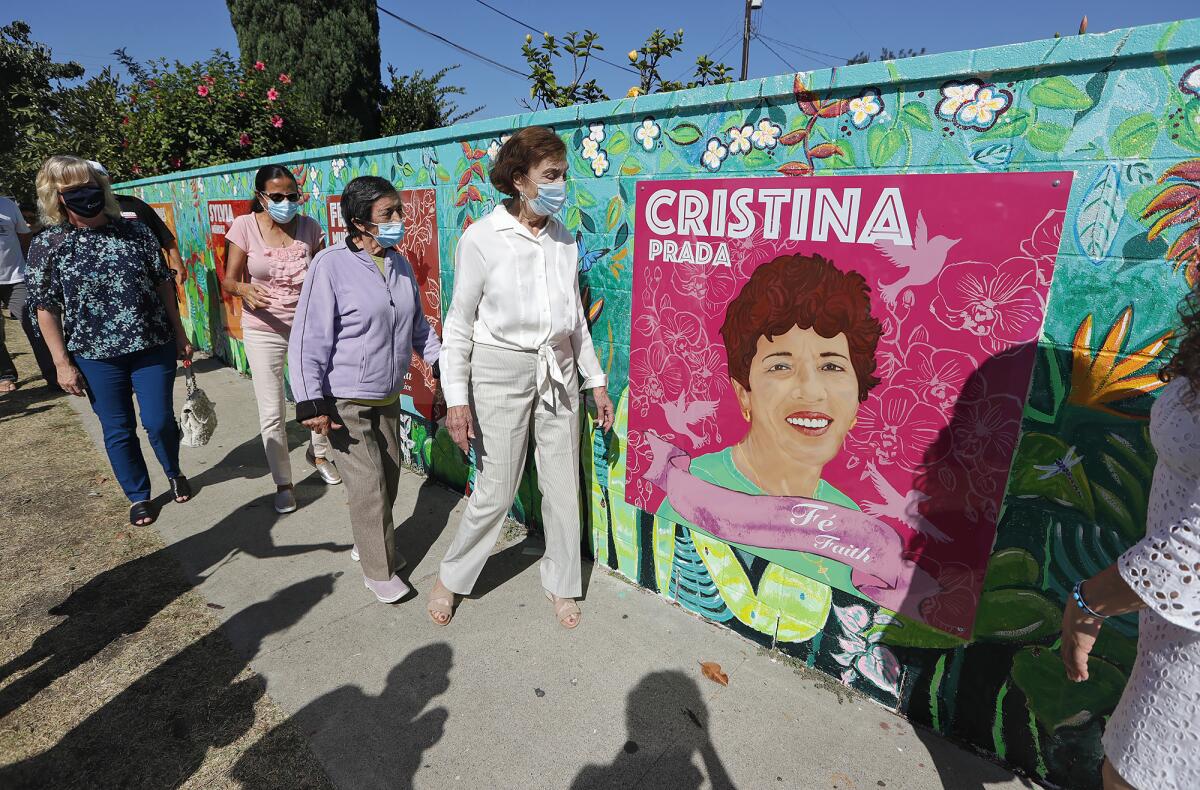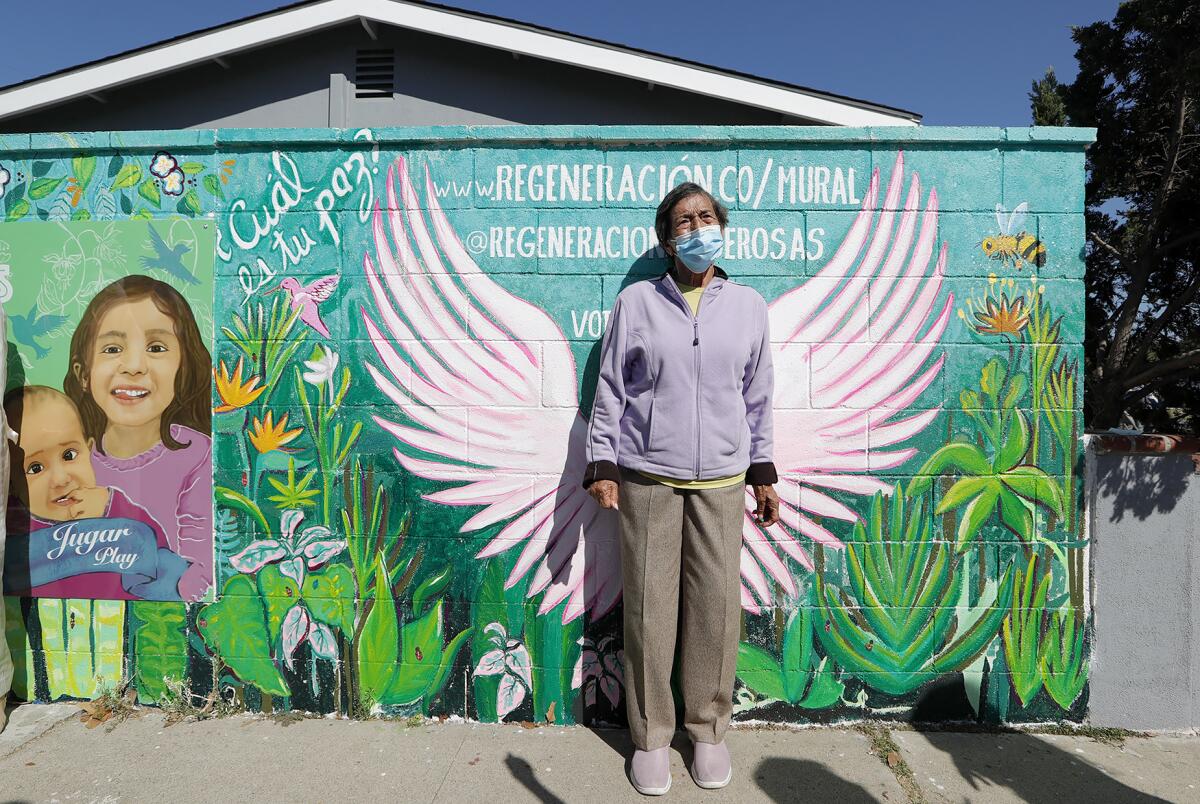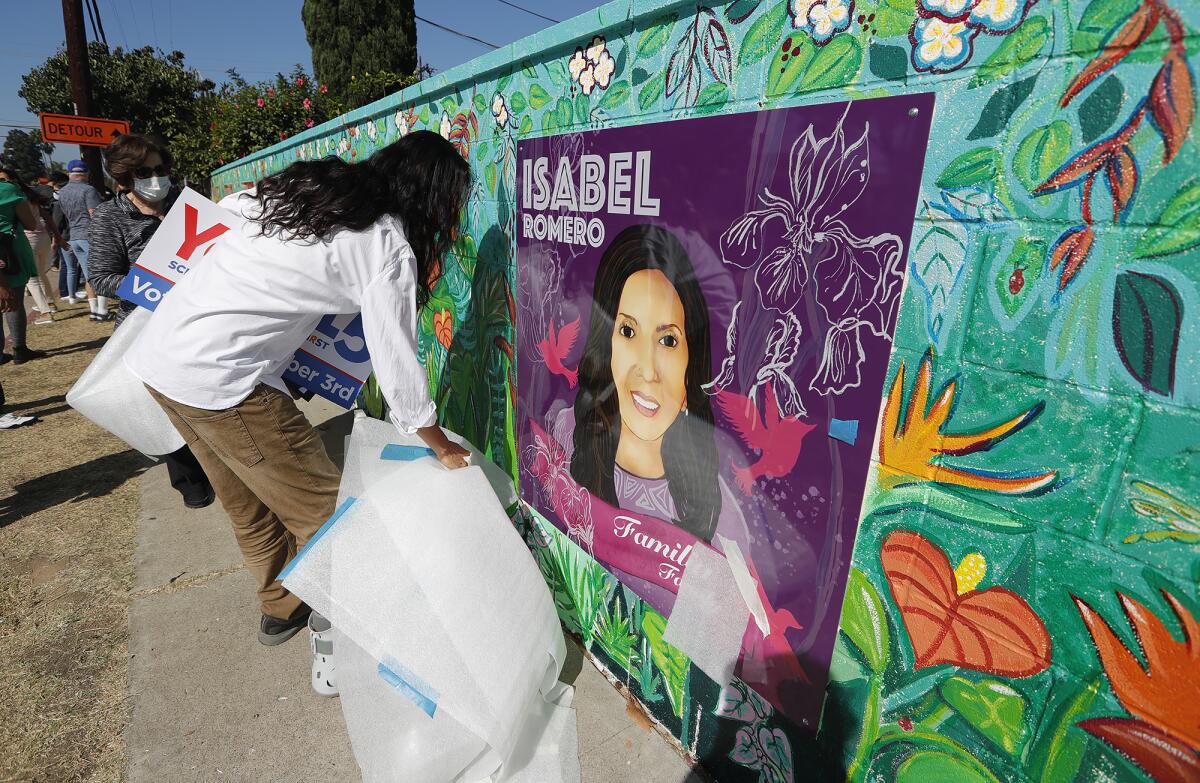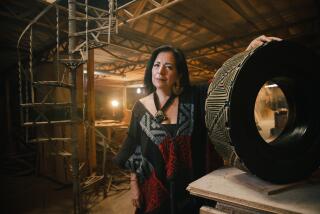Costa Mesa art project celebrates the impact of powerful Latinas known as ‘poderosas’

Dolores Huerta — who fought alongside César Chávez to help California farmworkers organize to improve working conditions and who tirelessly championed equality for women — has been both arrested and praised for her civil rights efforts.
But for every Huerta, there is a Cristina Prada, a Colombian immigrant who spent long days cleaning rooms at Hoag Hospital in Newport Beach before signing on for afternoon shifts as an Anaheim hotel housekeeper and cleaning homes on weekends, all while raising children as a single mother.
A mural unveiled Monday on a wall outside a residence on the 1300 block of Costa Mesa’s Baker Street attempts to unify the vastly ranging stories and struggles of poderosas — strong women — into a message of hope and inspiration during tumultuous times.
The project honoring 11 Latinas was conceived by Camilo Romero, Prada’s grandson and co-founder of Regeneración Colombia, a peace-building initiative that aims to heal intergenerational trauma through storytelling.

Romero was thinking of his grandmother, who worked her entire life and is now battling Stage 4 breast cancer, and of his hardworking mother, Isabel, right before his mother’s Sept. 14 birthday.
He thought about how he and his sisters flourished from the rich opportunities afforded by the struggles of those who came before and of his young nieces, who will one day step into their own power. As Hispanic Heritage Month approached, it seemed appropriate to honor such strength.
William Camargo’s work will be shown in Grand Central Art Center and MUZEO storefronts for public viewing starting Oct. 3.
The 74-foot cinder block wall outside his mother’s Costa Mesa home provided the perfect canvas for a public art piece. And so, with a bud of an idea, Romero enlisted help from Colombian artist Alicia Rojas to bring the mural to artistic life.
“The thought was simply to celebrate women — then we thought that we should recognize all Latina women,” Romero said of the final project. “These are brown women who probably were underestimated, who have achieved status without thinking they’re better than anyone else.”
The mural honors 11 poderosas in eight portraits that include symbolic elements and a representation of each woman’s story and connection to California.
Some of its subjects, such as Huerta, are historic ones.
Frances Muñoz was California’s first Latina judge, appointed to the Orange County Harbor Judicial District by Gov. Jerry Brown in 1978. Santa Ana native Sylvia Méndez was 8 when she was refused entrance into a Westminster school — an act that inspired a landmark legal case won by her parents in 1946.
Modesta Ávila became Orange County’s first convicted felon in 1889, when she attempted to protest the incursion of the Santa Fe Railroad onto her San Juan Capistrano property through eminent domain and was arrested. Her likeness on the mural is a creative rendering of her booking photo.
Alongside the famous figures are portraits of Romero’s family.
Prada is depicted surrounded by orchids, the national flower of Colombia, and with the word “faith” in Spanish and English underneath. Romero’s mom represents “family,” while his sisters represent “future” and a portrait of his three young nieces celebrate the spirit of “play.”

“They’re all luchadoras — they’re all guerreras,” Rojas said of the fighting spirit inherent in the mural’s subjects. “Latina women are such an important part of making America, especially in Orange County. I see myself in these women.”
For Monday’s unveiling, Romero and Rojas convened a small gathering of artists and advocates to celebrate the project and the spirit of poderosas everywhere. Muñoz and Juanita Chávez, Huerta’s daughter, joined Romero’s mother and grandmother as honorees.
The likenesses on the mural, sponsored by Orange County arts nonprofit Community Engagement, have been rendered in a coloring book the Dolores Huerta Foundation has agreed to publish and distribute to children in California’s Central Valley.
Prada, 90, and Isabel Romero expressed gratitude for their inclusion in the project.
“I’m honored and blessed to be in front of you guys and to feel the love of these artists,” Romero said. “It’s such a beautiful gift from my son — I am very, very touched.”
Although work on the mural began without a permit from Costa Mesa’s Parks, Arts & Community Services Commission, city staff learned of the project and sanctioned its completion. Mayor Katrina Foley shared brief comments at Monday’s ceremony.
“Our city is going through so many changes, where we’re all coming together and becoming more inclusive,” she said. “We’re the city of the arts. What better place to recognize these incredible women than right here in Costa Mesa.”
“They’re all luchadoras — they’re all guerreras. Latina women are such an important part of making America, especially in Orange County. I see myself in these women.”
— Alicia Rojas, artist
Afterward, attendees lined up on Baker Street while Rojas and Romero removed plastic shrouds from the portraits. Some posed by their likeness or stood for a photo in between a pair of painted wings intended to encourage young girls to see themselves as poderosas..
Reflecting on the ups and downs of creating public art during a pandemic — the questions from neighbors, some grappling over a permit — Romero determined the effort was well worth it.
“In the end, the overwhelming feeling has been of gratitude and of curiosity,” he said. “That’s the main message — caring is contagious too, not just the coronavirus.”
Cardine writes for Times Community News.
More to Read
Sign up for Essential California
The most important California stories and recommendations in your inbox every morning.
You may occasionally receive promotional content from the Los Angeles Times.











